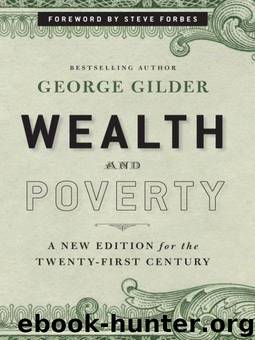Wealth and Poverty: A New Edition for the Twenty-First Century by George Gilder

Author:George Gilder
Language: eng
Format: mobi
Tags: Business & Money, Biography & History, Conservatism & Liberalism, Commentary & Opinion, Politics & Government, Reference, Organizational Behavior, Free Enterprise, Economics, Public Affairs & Policy, Economic Policy, Politics & Social Sciences, Poverty, Economic Conditions, Economic Policy & Development, Popular Economics, Ideologies & Doctrines, Specific Topics, Political Economy, Social Sciences
ISBN: 1596988096
Publisher: Regnery Publishing
Published: 2012-07-29T22:00:00+00:00
CHAPTER FOURTEEN
THE MAKE-WORK ILLUSION
WHENEVER THE AMERICAN ECONOMY approaches recession, there is always a boom in the business of saving or creating jobs. Unlike most enterprises, this business tends to be run by politicians, and it thrives not on savings and investment but on taxation and talk. John Connally, for example, repeatedly brought crowds to their feet during his 1980 presidential race with promises to protect the jobs of U.S. workers by reducing foreign trade and competition: “Let the Japanese sit on their docks in their Datsuns and watch their Sony TVs themselves.” The Carter administration proposed to create jobs by expanding the Comprehensive Employment and Training Act (CETA), already spending some $12 billion annually, into a national program of guaranteed employment for all.
As the economic and political portents of the new decade darkened our horizons in late 1979, politicians on all sides rushed to save jobs by subsidizing Chrysler, the embattled automotive firm that managed to lose nearly a billion dollars in 1979. Connally even proposed a federal come-and-get-it fund for all large and failing companies. Even such a staunch conservative as columnist Patrick Buchanan, a former Nixon speechwriter, demanded government action on behalf of the afflicted automotive firm. “This is a time for Republicans to rise above principle,” he wrote, and “leave Ralph Nader to mouth the moth-eaten clichés from Republican conventions of generations ago.” Buchanan went so far as to quote the dubious findings of the Congressional Budget Office, which predicted “the permanent loss of a quarter of a million jobs” if Chrysler melted down.1
The country was moving toward a system like Great Britain’s in the seventies. Business was flogged mercilessly by government officials and regulators until it proved itself innocent—and perhaps worthy of subsidies—by reason of failure and incompetence. Steel firms that could show only a modest level of ineptitude were compensated by import protections and exemptions from antitrust laws (which never should have been applied in the first place). A catastrophic series of blunders, such as Chrysler’s, already causing massive layoffs of workers, might win for the company an award from Washington as a precious provider of jobs.
Meanwhile the prevailing research on employment depicted most unsubsidized jobs as bad for health and family. According to the litany, farm workers are woefully exploited; industrial workers are poisoned; secretaries are sent for coffee and Danish; assembly-line laborers are made to perform repetitive tasks; telephone operators are denied the opportunity to climb poles. Technicians in high-technology companies destroy the jobs of others. Workers in energy companies cause cancer and traffic jams.
In fact, the only employment generally acceptable in scholarly circles is work which does not produce anything. The identifying mark of these functions, apart from being well-paid, is that they allow the jobholder to pretend he isn’t in it for the money. As David B. Wilson of the Boston Globe wrote,Never mind that manufacturers of bologna, unleaded gasoline, and screwdrivers, grain farmers and real estate salespeople actually do more for their fellow human beings than any number of bureaucrats and teachers of sociology.
Download
This site does not store any files on its server. We only index and link to content provided by other sites. Please contact the content providers to delete copyright contents if any and email us, we'll remove relevant links or contents immediately.
| Anthropology | Archaeology |
| Philosophy | Politics & Government |
| Social Sciences | Sociology |
| Women's Studies |
The Secret History by Donna Tartt(19088)
The Social Justice Warrior Handbook by Lisa De Pasquale(12190)
Thirteen Reasons Why by Jay Asher(8910)
This Is How You Lose Her by Junot Diaz(6887)
Weapons of Math Destruction by Cathy O'Neil(6280)
Zero to One by Peter Thiel(5802)
Beartown by Fredrik Backman(5754)
The Myth of the Strong Leader by Archie Brown(5507)
The Fire Next Time by James Baldwin(5446)
How Democracies Die by Steven Levitsky & Daniel Ziblatt(5219)
Promise Me, Dad by Joe Biden(5153)
Stone's Rules by Roger Stone(5088)
A Higher Loyalty: Truth, Lies, and Leadership by James Comey(4964)
100 Deadly Skills by Clint Emerson(4925)
Rise and Kill First by Ronen Bergman(4789)
Secrecy World by Jake Bernstein(4753)
The David Icke Guide to the Global Conspiracy (and how to end it) by David Icke(4720)
The Farm by Tom Rob Smith(4512)
The Doomsday Machine by Daniel Ellsberg(4490)
